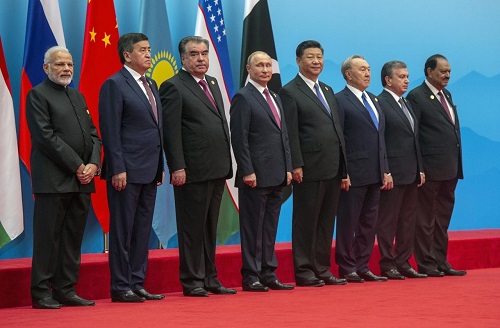Reuters photo
By
Mikhail Konarovsky
The G7 summit in Quebec (Canada) and the SCO summit in Qingdao (China) took place at almost exactly the same time and once again clearly demonstrated the ever growing multipolarity of global and trans-regional development. However, while the Group of Seven meeting took a step backwards of sorts – or, put simply, actually failed – the SCO summit took a step forward towards its expansion and the further development of cooperation between the member states.
The Qingdao summit finalized the results of China’s year as chair of the Shanghai Cooperation Organisation (SCO). In addition to the traditional busy schedule of various levels of working meetings, this year saw major trade, economic and cultural events, including the first SCO Women´s Forum. An unscheduled meeting of the Council of Foreign Ministers of the Member States of the Shanghai Cooperation Organisation was also held for the first time on the sidelines of last year’s session of the UN General Assembly in New York. And in Qingdao, the practice of holding multi-level, bilateral meetings between the leaders of member states, observers and the SCO dialogue partners continued. An important event in Russia–China relations in the run-up to the summit was the state visit by the President of the Russian Federation, which resulted in the deepening of the comprehensive bilateral strategic partnership. The leader of Kazakhstan made a similar trip to China, as did the President of Kyrgyzstan, the country which officially assumed chairmanship of the SCO for the upcoming year following the Qingdao summit.
The endorsement of the principles and objectives set out in the 2001 Charter of the Shanghai Cooperation Organisation and the Development Strategy until 2025 was an important political component of the summit, a matter of momentous importance for both the SCO itself and for its positioning on the world stage in its new and expanded composition. This was due to significant deepening of the SCO’s geopolitical dimension following the accession of India and Pakistan last year, whose leaders first took part in the organization’s activities at the Qingdao summit. As a result of the expansion, the Shanghai Cooperation Organisation has become the world’s largest association, the global nature of which Russian President Vladimir Putin referred to in an interview with the China Media Group on June 6, 2018.
Against this background, the detailed Declaration adopted at the summit emphasized that the “Eight” had acquired a new dynamic and quality of interaction. Of especial significance was a confirmation of the willingness of all eight members to work together to unlock the full potential of the SCO in other areas. At the same time, they confirmed their commitment to further observe international treaties and documents. All this, as well as the intention to contribute in every possible way to build a new type of international relations based on the principles of mutual respect, fairness, equality and mutually beneficial cooperation, stood out in sharp contrast to the trends of protectionism, hegemony and the search for unilateral advantages demonstrated at the G7 summit.
The meeting in Qingdao focused on modern international relations in general, along with the state of affairs in various regions of the world in particular. Stressing the Group’s full support for the activities of the United Nations as a universal international organization, the parties noted the lack of options in Syrian political dialogue in accordance with UN Security Council Resolution 2254, actions approved on the basis of consensus to deal with the heated situation around the Iranian nuclear programme, the situation on the Korean Peninsula and the Ukrainian crisis.
The SCO member states confirmed the security priorities of the organisation, not only condemning all forms and manifestations of terrorism, but also calling for the efforts of the international community to be united in counteracting the involvement of youth in the activities of terrorist, separatist and extremist groups. The countries believe that this could be achieved by creating (with the UN as the major coordination body) a united anti-terrorist front free of politicization and double standards, as well as by reaching consensus on the adoption of the Comprehensive Convention on International Terrorism. An important practical step that the Organization itself could take in this direction may be to increase the overall role of the Regional Anti-Terrorist Structure of the SCO (RATS) and to expand its activities. This would appear to be very useful for the purpose of coordinating the corresponding international efforts of the SCO member states, as well as in the light of the growing interest of observer countries and the SCO dialogue partners in this aspect of their collaboration with the eight countries.
One tangible achievement of the Qingdao summit is the approval of another three-year programme on combating terrorism, separatism, and extremism (the SCO Member States Programme on Cooperation in Combating Terrorism, Separatism and Extremism for 2019–2021), which calls for joint exercises and counter-terrorism operations, as well as for an active exchange of experience and information. The approval of the SCO Anti-Drug Strategy for 2018–2023 and the Convention for Cooperation on the Prevention of Drug Abuse are also closely tied to this. Together with the Joint Appeal to Youth (with a focus on counteracting terrorism, drugs, religious and ethnic intolerance, etc.) and the Programme of Action for its implementation, these documents are designed to form a single integrated system for countering the “three evils” mentioned above. Last year’s SCO Convention on Countering Extremism, which requires urgent ratification, as well as expanding cooperation among the member states in the field of international information security are called upon to play an important role here as well. Everything now depends on the precise conformity and practical impact of the actions of each of the sides of the SCO octagon.
Responding to the identified in Qingdao growing threat of foreign militants entering the SCO territory to carry out terrorist and extremist activities, the summit participants once again confirmed their unfailing support for regulating the situation in Afghanistan exclusively by peaceful means and by the Afghan people themselves, and called for a strengthening of the mechanisms of dialogue and cooperation in order to ensure the launch of such a process. The appeal is very timely, as several regional structures that have to deal with this problem (with the participation of external players) in fact compete with each other, often duplicate the others’ actions and, more importantly, are practically ineffective.
The activities in regional security of the SCO itself are unlikely to be successful if additional attention is not paid to the Afghan issue. With this in mind, an attempt was made last autumn to give a new impetus to the work of the previously established SCO–Afghanistan Contact Group in an expanded format. A meeting was held in Moscow last autumn, and another one took place in Beijing on the eve of the Qingdao summit. However, serious interest in increasing the SCO’s activities regarding Afghanistan expressed at the meetings has not yet been substantively documented (as a result of which the Declaration merely “summed up the results” of the two events in very general terms). At the same time, the actual political weight of the eight states on the regional and global stages will largely depend on the forethought, feasibility and orientation of future steps taken by the SCO to facilitate the peace process in this country.
A few years ago, one of the main topics of conversation with regard to the SCO was how the organization was beginning to catch up in terms of its economic component (in comparison with security issues). This trend has gained significant momentum following the summit in Qingdao. In the past, the most active role in the search for alternatives for the joint economic development of the SCO states was played by the creation of the Eurasian Economic Union (EAEU) and the promotion by Beijing of the Silk Road Economic Belt concept, which later transformed into the One Belt One Road project. By positioning the One Belt One Road Initiative as its main foreign economic concept, China makes it a priority to ensure support for the project through bilateral and multilateral contacts at various international venues. At the same time, a special place is afforded for the Shanghai Cooperation Organisation. This topic is closely related to Beijing’s widely publicized foreign policy slogan of building a “community of common destiny,” which for the time being remains rather vague and lacking in real content. The Qingdao Declaration drew particular attention to this fact.
Russia and other SCO states (with the exception of India, a fact also reflected in the meeting’s final document) generally support the One Belt One Road concept, while actively advocating its involvement with other economic projects in the region. The signing of an agreement on economic cooperation between the EAEU and China as a first step towards removing restrictions on the development of economic interaction among the participants in the process shortly before the Qingdao summit was a significant event in this respect. Kazakhstan has also acted in a similar vein, agreeing to integrate the One Belt One Road into its Nurly Zhol New Economic Policy.
A great deal of scrupulous and extremely complicated work will be required to integrate the SCO states economic projects, which include the Russian Greater Eurasian Partnership initiative (the first stage of which calls for the establishment of cooperation between the EAEU, the SCO and the ASEAN, and then with the One Belt One Road Initiative). The main task will be to achieve a consensus to ensure the real economic interests of each participant are met, with an eye to their specific approaches, interests and concerns. Serious compromises will be necessary, and the SCO’s widely promoted “Shanghai Spirit” will be indispensable in achieving them. As a kind of ideological superstructure for the SCO, it is based on the principles of complete equality, mutual consultations, the desire for joint creative development, etc.
It would be wise to consider the significant expansion of SCO’s cultural and humanitarian activities in recent years from this very perspective. The declaration from this past summit reflects the intention of the parties to continue to increase interaction and deepen and diversify it with due account of the diversity of the civilizations and peoples of the “Big Eight” countries in order to strengthen mutual understanding and respect for the cultural traditions and customs of SCO member states as an integral part of the rapprochement of their peoples. In view of this, the five-year Memorandum of Understanding on Cooperation Between UNESCO and the Secretariat of the Shanghai Cooperation Organisation signed during the summit will be of great importance. The document further served to confirm the transition of the SCO’s international activities to a level beyond its geopolitical range.
The multifaceted activities of the Shanghai Cooperation Organisation continue to attract increasing attention from the global community. However, certain peculiarities and features of its functioning should keep it from being compared to the western Group of Seven, although such comparisons are inevitable. At the same time, if the SCO manages to cope with the problems and challenges it currently faces it and deliver pragmatic solutions to specific tasks in all three areas of its current and prospective activity with the fullest possible consolidation of ranks, then it will be able to claim the status of not only the largest, but also the most influential union in Eurasia.
This article was originally published by the RIAC and is reproduced with their kind permission
Mikhail Konarovsky
Ambassador Extraordinary and Plenipotentiary of the Russian Federation. Senior Research Fellow at the Institute of International Research, MGIMO University, RIAC member.



No Comments Yet!
You can be first to comment this post!